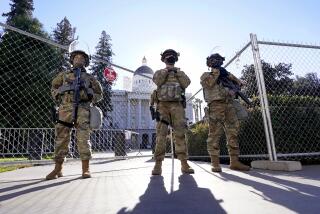Top Canada Military Officials Ensnared by Somali Scandal
- Share via
TORONTO — What began as a tragic but seemingly isolated incident of brutality by Canadian soldiers on peacekeeping duty in Somalia three years ago has gradually spiraled into a national scandal that now threatens the careers of Canada’s two top defense leaders, Gen. Jean Boyle, military chief of staff, and Defense Minister David M. Collenette.
At issue is whether high-ranking officers, including Boyle, sought to impede public inquiry into events in Somalia by altering or destroying official documents and computer files.
Boyle has denied the accusation by a subordinate that he participated in a cover-up, and he has been backed by Collenette, the man who made him chief of staff. Collenette’s boss, Prime Minister Jean Chretien, has also expressed confidence in both men.
But the scandal--replete with whistle-blowers, investigative journalism, public hearings and political sniper fire--keeps spreading.
On Thursday, the military belatedly delivered 12 boxes of potential evidence to a special commission of investigation.
Military analysts note that the contretemps not only is undermining public confidence in Canada’s military and damaging morale in the ranks, it is diverting government attention from the fundamental question of what role this country’s 67,000-member armed forces should assume in the post-Cold War era.
For the silver-haired Boyle, the scandal is the first glitch in a career arc that has sped upward as fast and flawlessly as one of the jet fighters he used to pilot.
Just since 1988, Boyle has commanded a fighter wing stationed in Germany, overseen the deployment of Canadian fighter aircraft in the Gulf War, served as commandant of the Royal Military College in Kingston, Ontario, and worked as associate assistant deputy minister for policy and communications, a top-rung public relations job for the armed services.
Now 48, he was named chief of staff last December.
However, one reason Collenette selected Boyle was the perception that he was unsullied by the Somalia incident. That assumption has come into question.
The Somalia scandal surfaced in March 1993, when it was disclosed that a 16-year-old Somali youth had been fatally tortured by members of the Canadian Airborne Regiment, a special forces unit stationed in the African country on United Nations peacekeeping duty. The youth had been caught inside the regiment’s camp and was suspected of pilfering equipment.
Four soldiers were convicted at courts-martial in connection with the killing.
After subsequent revelations of racism, brutality and hazing, the regiment was disbanded.
But the government also named the three-member commission, headed by a federal judge, to probe the military response to the Somali murder.
The commission has been going about its work but recently complained that some documents it needs mysteriously disappeared from Defense Ministry files.
Enter Col. Geof Haswell.
Haswell, an army public relations man, told Canada’s Globe and Mail newspaper this month that senior defense officials, including Boyle, approved a plan to purge documents on Somalia to prevent them from becoming public.
Haswell since has been ordered to court-martial for altering records and, depending on one’s view, has emerged as either the man with the smoking gun or a liar covering for his own misdeeds.
*
Boyle responded to Haswell in a videotaped message to the troops April 4. In what was quickly labeled “the I-am-not-a-crook speech,” the general, looking ill at ease and fiddling with a pen, declared: “I never participated in any effort to interfere with the work of the Somalia commission.”
He went on to order that the entire armed forces drop all work except “essential services” on April 9 to engage in a search for Somalia records.
That’s where the 12 boxes came from Thursday.
As the commission resumes its work, it is promised that Boyle and, if his lawyer permits, Haswell eventually will appear and tell their stories to the members and the television cameras.
More to Read
Sign up for Essential California
The most important California stories and recommendations in your inbox every morning.
You may occasionally receive promotional content from the Los Angeles Times.













